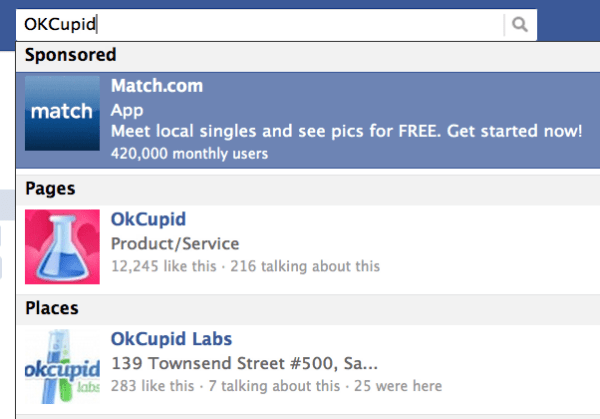
Last month Facebook began testing a “Sponsored Search” ad unit geared towards those searching on Facebook. Today it has been released to advertisers. The new ad unit operates very similarly to traditional Facebook advertising as they can leverage demographics, location, connections and interests/likes. Here is a post on sponsored search by Hubspot.
How Facebook’s Search Ads Work
According to Facebook’s message to marketers:
Sponsored Results gives brands the ability to buy ads in search results, bringing more awareness and traffic to your App, Page, or Place. Sponsored Results give you:
1. Expanded distribution of your message, with placement in one of the most used features on Facebook.
2. The ability to target what people are looking for, by appearing alongside related Apps, Pages, and Places.
3. Flexibility to customize your landing destination, such as a specific tab on your Page.
Brands are not able to drive offsite using this product, but you will have the ability to drive to specific Pages, Tabs, and Canvas Applications.
Okay, so let’s talk about this in more detail …
Advertisers taking advantage of Facebook’s new search ads can target searchers who are looking for specific apps, Facebook pages, and places, and they have the ability to include a link in the search results that directs searchers to their own app, page, custom page tab, or page post. These PPC search results are clearly marked as ‘Sponsored’ at the top of the ad, as you can see from the example below:
Furthermore, users also have the option of hiding certain ads by clicking the ‘X’ in the right-hand corner of the ad. Doing so launches a pop-up with a question inquiring why the user is choosing to hide the ad (options include “uninteresting,” “misleading,” “offensive,” “repetitive,” etc.).
Although advertisers don’t yet have the ability to direct searchers off-site from Facebook to an external web page, their ads can appear higher than the organic results for a given search. This gives Sponsored Results ads the potential to steal traffic from competitors, as you can see by the sponsored Match.com result appearing before the organic OkCupid results for the search “OKCupid.”
How to Purchase Sponsored Results
While Facebook started rolling out Sponsored Results to bigger app developers like Zynga and Match.com, TechCrunch reports that Facebook is now rolling out the functionality more broadly.
We’re told that Facebook advertisers will soon have the option of purchasing Sponsored Results through Facebook’s ads API tool, the Power Editor. In addition, the Ads API documentation for building Sponsored Stories already exists.
So … Will Sponsored Results Be an Effective Form of Facebook Advertising?
As with any new Facebook ad offering, we’ll have to wait and see. However, we’re skeptical about it really challenging Google AdWords. As TechCrunch highlights, Facebook users rarely use Facebook search for anything other than an attempt to find a very specific Facebook presence. For example, users would use Facebook search if they were trying to find the official Facebook page for a particular restaurant they already know about. But if they were searching for different Mexican restaurant options in their geographic region, they probably wouldn’t turn to Facebook search — they’d go to Google!
Personally, I think Facebook will need to make a some changes to its search functionality in order for it to be a major selling point to Facebook advertisers. As a user, I rarely use Facebook search for anything. And to be honest, sometimes it’s a lot easier for me to find a particular brand by searching “Brand X on Facebook” in Google rather than in Facebook search, where a lot of times I end up on unofficial brand pages before I can find the official page.
What do you think about Facebook’s foray into PPC ads? Will you experiment with them to promote your Facebook presence?
Blog source : Hubspot



